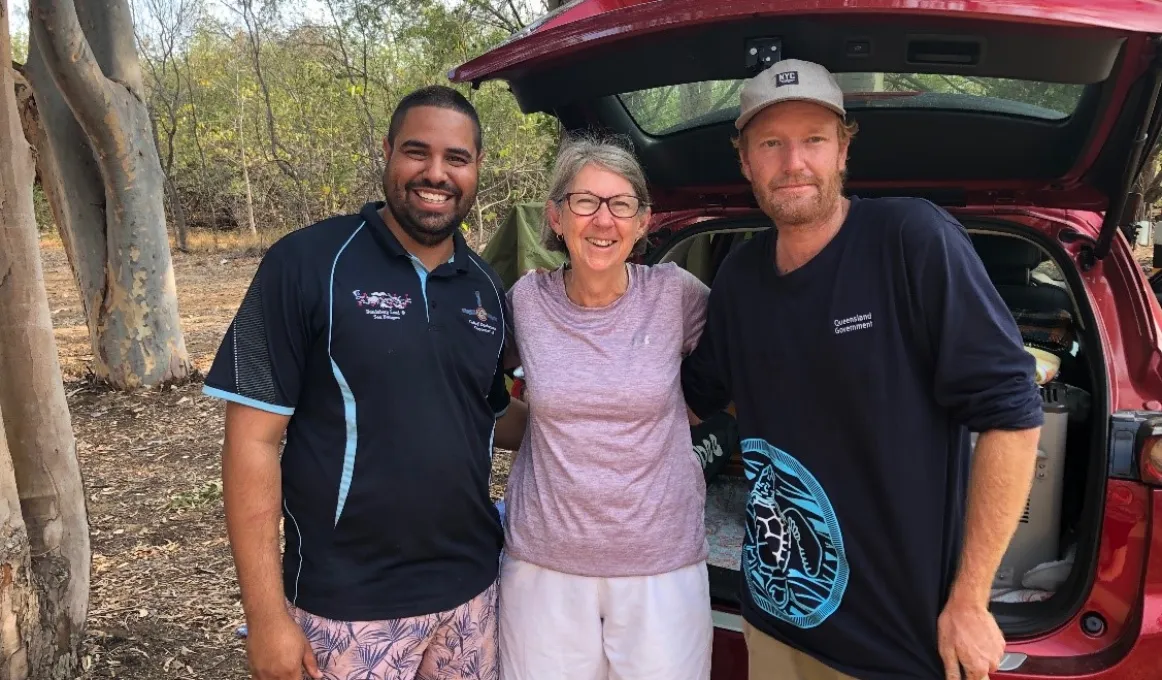World Environment Day – ‘Time for Nature’

World Environment Day is a call to action. When we care for nature we care for ourselves.
World Environment Day is celebrated every year on 5 June. This year’s theme, Time for Nature, is a call to action.
‘To care for ourselves we must care for nature.’
Mary Kirk from Brisbane took action recently when she drove up to Bundaberg to volunteer for the Queensland Turtle Research Conservation Project.
She was supported by Gidarjil Sea Rangers, Reece McDowell, Rodney Phelps and Saranne Giudice.
‘I was nervous at first because the volunteers and Indigenous rangers are not just there for fun, they are there to train and work to collect data about the turtles which is a big responsibility,’ Mary said.
‘My anxiety soon faded as I walked along the beach under the night stars with the Indigenous rangers and fellow volunteers learning more about turtles.’
Every year marine turtles come to Port Curtis Coral Coast sea country to nest.
They are particularly important to the area’s Traditional Owners who regard them as sacred and totemic animals. They feature in many stories and paintings from the region and have a great deal of cultural value.
The Gidarjil Sea Rangers work alongside volunteers from all over Australia and the world to protect the turtles at Mon Repos and along the coast each year by gathering data for the Project.
Marine turtles are threatened from multiple sources and the data collected helps to determine the impact of the threats and turtle population levels.
The sea rangers and volunteers are trained to measure and tag turtles, record tag numbers and relocate nests to higher dunes if necessary.
They work tirelessly together all through the night to monitor both nesting females and emerging hatchlings.
Ranger Reece McDowell said he enjoyed getting to know the volunteers, including Mary Kirk.
‘There are people from all walks of life getting training and volunteering at Mon Repos,’ Reece said.
‘I’ve met other Indigenous rangers, backpackers from overseas, retired people and university students and they all had a love of sea turtles in common.’
Reece and his fellow Gidarjil Sea Rangers also assist the volunteer community group Turtlecare along Wreck Rock beach. There they helped install a nest relocation cage to protect egg clutches from predation by foxes.
The passion, commitment and time spent by sea rangers, volunteers and community groups is an important contribution to a positive future for marine turtles.
It is one of many ways that all of us can care for nature and thereby, care for ourselves.
‘The overall experience of volunteering with the turtle research was very rewarding,’ Mary said.
‘I love working with mother nature and meeting like-minded people.’
Find out more
World Environment Day is celebrated every year on 5 June. It is the ‘United Nations’ main way to encourage respect for, and action to preserve our world.
The NIAA supports the Gidarjil Sea Rangers through the IPA and Working on Country program to manage their Land and Sea Country, protecting it from invasive species and maintaining its natural and cultural heritage.
For more information about becoming a volunteer, see Find a volunteer project—Queensland Turtle Research Conservation Project.